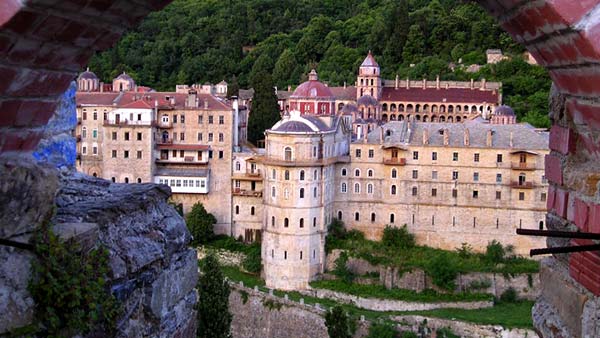 It’s hard to imagine how dark it is when morning services start on Mount Athos. You have to blindly grope the deep throne-like wooden seats in the church — or risk sitting on the lap of another worshiper.
It’s hard to imagine how dark it is when morning services start on Mount Athos. You have to blindly grope the deep throne-like wooden seats in the church — or risk sitting on the lap of another worshiper.
The first bell rings at about 3 a.m. Most of the monks show up by 3:30 a.m. and the prayers last around three hours.
As a non-Orthodox visitor to the Bulgarian Orthodox Christian monastery of Zograf, I was welcomed to join the services but asked to stay in the back of the church in order to not disrupt the worshipers.
The church in the monastery courtyard was ancient and lit only by candles and oil lamps. The light cast warm shadows and reflections on the gold ornaments on the walls and iconostasis. While Catholic churches might feel lofty and grand, Orthodox churches tend to be cluttered with knick-knacks and smudged with candle smoke. They feel more like your grandmother’s living room.
The scene was a harmonious visual backdrop for listening to the monks sing, chant prayers, kiss icons and sway long chains of bells and incense holders.
The deep, mellow sounds were an audial demonstration of the monks’ spiritual commitment and their efforts to be closer to God. These men took a vow to stay in the monastery until their last breath. They spend about six hours per day in prayer, every day.
Mount Athos really is another world. In the Vatopedi Monastery for example, the clocks still tell Byzantine time – according to which midnight starts daily at sunset.
Zograf operates according to modern time but is the only one of the 20 monasteries on Athos which doesn’t recognize daylight savings time.
“Why should it?” asked Kiril, a novice monk at Zograf. “We’re a monastery.”
I didn’t have a good answer.
With only a four-day visa to stay on the Holy Mountain, I decided to visit two of the 20 monasteries: Xenophontos, one of the 17 Greek monasteries, and Zograf, the only Bulgarian one. Athos also has a Serbian monastery and a Russian one.
Most people arrive at Zograf by walking the two miles or so up the dirt road from the port. The monastery has a special reception room where visitors are greeted with coffee and water.
The monasteries are obliged to offer accommodation and food to all visitors – although people can be turned away if the beds are full, so pilgrims are asked to call in advance.
I was seeking a lot of answers in a short amount of time. My reporter’s questions became more pushy and Kiril resisted.
“It’s not common to pressure people around here,” he said.
